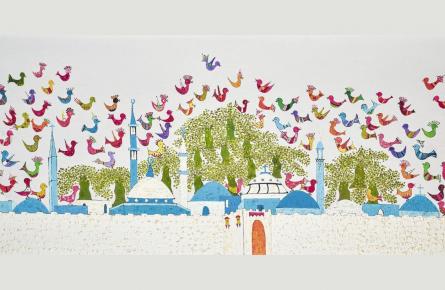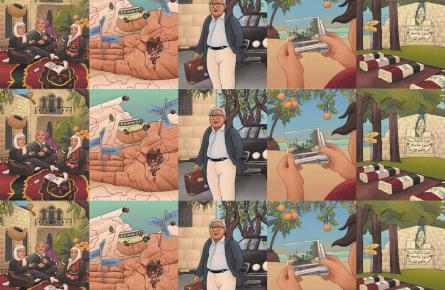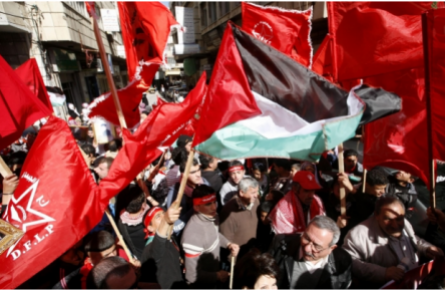While strolling a holiday market in the Washington, D.C. area, Palestine Square was intrigued by the sight of a booth displaying toys with Arabic lettering and women’s accessories and shoes with unmistakable Palestinian embroidery. Upon heading over, your correspondent learned that it was the project of Child’s Cup Full (CCF), a non-profit organization based in the West Bank.
CCF was the brainchild of Janette Habashi, Professor at the University of Oklahoma. Dr. Habashi founded CCF back in 2008 after spearheading a multi-year fundraising campaign to support grassroots education for refugee children in the West Bank city of Jenin. “After three years, she realized that if she could create employment for the mothers of refugee children, the organization could provide long-term support for the children and the community at large,” Cayley Pater, Assistant Director of CCF, told Palestine Square.
“Our mission is to provide training and employment opportunities to refugee and low-income women artisans,” Pater added. CCF’s approach is to create sustained economic growth “by building upon existing skills of low-income, welfare-seeking, and refugee women artisans and providing access to the global marketplace.”

This mission comes to life at the artisan center founded by Dr. Habashi in Zababdeh, a village roughly 9 miles from Jenin. Since 2011, the center has been producing children’s toys “designed with an educational purpose,” relates Pater. Moreover, CCF toys are made from recycled material from local bedding and furniture companies; further aiding the Palestinian economy.
After concentrating on toy production for several years, CCF expanded its development model last year. “We decided that we wanted to incorporate traditional Palestinian embroidery into some of our products,” Pater says. It partnered with Symbology Clothing and crafted embroidered pieces for their Fall/Winter 2015 collection. The collection eventually inspired CCF to create its own line of women’s shoes and accessories called Darzah.

Unveiling Passion
As noted above, CCF’s hiring practices targets low-income and/or refugee women. Applicants fill out forms detailing their household income, which is measured against the United Nation’s poverty scale (in this case, expenditures amounting to 10.3 Israeli shekels per person per day).
“Our reputation has grown considerably in the Jenin region,” Pater says about the Zababdeh center, which currently employs six women. “We have a long list of women on our waiting list, as well as several artisan groups in Ramallah, Hebron and Bethlehem who want to work with us. We are raising funds to scale up our operation so that we can expand in 2016.”
“In 2016,” Pater adds, “we also plan to start working with the Palestinian Ministry of Social Affairs (MOSA) in order to identify the most underprivileged women in the region.” Toward that goal, CCF “will prioritize welfare applicants in order to ensure that [CCF] training and employment opportunities are available to women artisans most in need.”

As for the experiences of women working with CCF, Pater relates many women report that their husbands and relatives “started giving [them] more respect” once they started working at CCF; and, furthermore, many enjoy the opportunity to support their families in a creative environment. “Precarious employment is very common in the West Bank, especially in the north, which is why we believe we can create lasting social and economic change with our global brand,” Pater adds.
And Pater provided us with a quote from Rahaf, CCF’s lead embroidery artisan:
I had a concealed passion that wasn’t visible, but working for Darzah and Child’s Cup Full unveiled that passion and allowed me to realize it in an incredible way. It taught me independence and allowed me to be secure my life after having to depend on others for so long. Working here, I have been able to be a productive go-getter for society, my kids, my house and I encourage every woman to come and work so she can play a pivotal role in society. I want to tell her that she can do whatever it is she wants while enjoying it and she too can unveil her passions.

From Palestine to the U.S.
“Both target audiences for the Child’s Cup Full and Darzah products cover socially-conscious individuals,” Pater says. Although both brands are sold globally, the U.S. market is the main focus. “With our Arabic toys, in particular, we focus on Arabic-speaking communities in the U.S.,” Pater adds.

CCF toys are currently sold in “toy shops, fair trade boutiques, and other small shops across the U.S. and Canada.” The company is also teaming up with Threadies to make teddy bears. “We have received a great deal of interest from new companies as well,” Pater says, “and we hope to be able to build capacity so that we can take on more orders [and] produce toys for bigger retailers.”
For its women’s line Darzah, launched last September, both the shoes and jewelry have met with “huge success,” says Pater, among women interested in high quality and ethical fashion. “Our tatreez embroidered shoes and accessories tell a story of women’s empowerment in the West Bank . . . and they provide an opportunity to connect women around the world through fashion.” Jewelry and shoes are sold in a few boutiques in the U.S. and Canada. This year, Darzah plans to collaborate with fashion designers. “Our dream is to one day have our embroidered shoes and accessories in stores like Anthropologie and Nordstrom,” Pater adds.
Grassroots Development

Looking toward the future, CCF hopes to “increase our impact by creating a consortium of artisan centers across the West Bank,” Pater says. “There is a huge opportunity for artisan groups throughout the region to work together to create jobs for women artisans who have a wide range of skills to offer.”
Pater emphasis what CCF has so far achieved: a new development approach that’s distinctly grassroots and “a unique combination of artisanship advocacy, international partnership development and strategic marketing in the U.S., all of which open doors to the global marketplace.”
And CCF hopes to one day come full circle with Dr. Habashi’s original mission: “Once we have achieved a sustainable business model, one of our long-term plans is to allocate a portion of our sales revenue to support grassroots education for refugee children in the West Bank.”
To purchase, learn more about and support Child’s Cup Full and Darzah, visit their websites.




